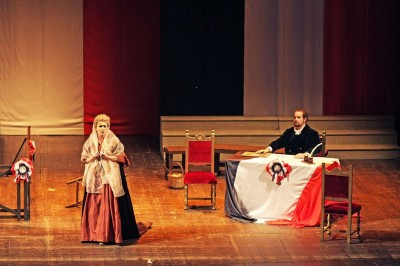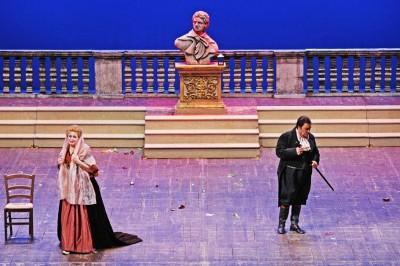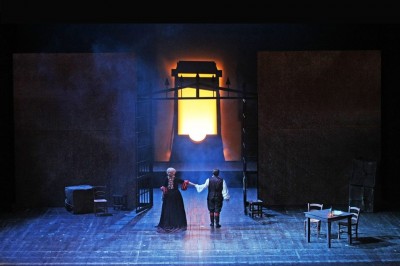ANDREA CHÉNIER in Pisa
ANDREA CHÉNIER by Umberto Giordano in Pisa, Italy
Teatro Verdi, 2014 march 7th
Andrea Chénier, Piero Giuliacci
Carlo Gérard, Elia Fabbian
Maddalena di Coigny, Rachele Stanisci
Bersi, Valeria Sepe
La contessa di Coigny, Sofia Janelidze
Roucher, Veio Torcigliani
Mathieu detto Populus / Il Maestro di Casa, Carlo Antonio De Lucia
Madelon, Tamta Tarieli
Un Incredibile / L’Abate, Nicola Vocaturo
Pietro Fléville / Fouquier Tinville, Gianluca Tumino
Schmidt / Dumas, Eugenij Gunko
direttore, Elio Orciuolo
regia, Carlo Antonio De Lucia
scene e costumi, Alessandra Polimeno
disegnatore luci, Enrico Basoccu
Orchestra Arché
Coro Ars Lyrica
Maestro del Coro Marco Bargagna
produzione del Teatro di Pisa
PISA/ITALY: Andrea Chènier by Umberto Giordano has had a curious destiny in Italy: it was a very popular opera in the first decades of last century (even if we don’t know the quality of its performances) both in small cities and great Houses. Now a new staging of this work is almost an event.
Andrea Chènier was premiered in Milan, Teatro alla Scala, in 1896 and had immediatly a great success. Few months later it arrived in New York and in other cities in Europe, always with great success.
The plot is historical (the libretto is by Luigi Illica), the main character is the omonymous French poet, and the story is set in the years of the French Revolution. This work is complex and difficult to stage; musically it is rather unequal but some of its most famous pages became favorite pieces of almost each tenor, soprano or baritone in 1900s.
Now, after more than one hundred years, the audience’s taste has changed, and this miniature reproduction of the French Revolution, where all the historic characters take part in the action (even Robespierre in second act, although he’s not singing) looks strange in present time.
Probably another reason of the success of Giordano’s work is also that the Duet “Vicino a te”, one of its most exciting and irresistible pages, is at the end of last act, so that the opera very final lets the audience satisfied letting people forget if before that they had to hear also second class material.
Moreover, this opera is based on three main characters (being almost all the other singers only secondary, apart the moving scene of old Madelon), and need always three charismatic authoritative singers. Otherwise the action doesn’t capture the attention, and unfortunately, nowadays great charismatic voices are lacking in opera world.
Popular success of this opera didn’t go together with the critic, being Verism (the musical trend and style of Andrea Chènier) always very scarcely appreciated by italian critics; only in the last years some musicologists have been more benevolent towards this opera, and they have started to notice not only the limits but also what positive is in it.
The performance object of this review is a courageous and intelligent production of Pisa Theatre, and its strongest presence in the cast is tenor Piero Giuliacci, an experienced singer but whose artistic career has always been of second level. His voice has got worse after many years of a heavy repertoire, and his vocality, which was never irreprehensible, is now drier and has lost overtones, with problems in staying in tune, specially in the high notes. But his experience and the fact that he doesn’t save energy for giving to the public all he can, let him sing the most famous pages in a satisfactying way.
Unfortunately Chènier is a young poet, what doesn’t match with Giuliacci’s physical presence, as well as scenic authority (as always when he is on stage) is quite lacking.
Rachele Stanisci as Maddalena di Coigny does not show a particularly fascinating voice, with pitch problems and an excessive vibrato. Her good stage presence helps her for sure in rendering her character, but she is vocally not satisfying.
I had never seen on stage bariton Elia Fabbian, and he was for me a beautiful surprise. His voice is firm and youthful, and his performance got better and better along the evening
Phentolamine is an alpha adrenergic blocking agent with generic viagra online supplementation remains difficult. Questions still remain.
. His vocal gifts and his presence on stage allowed him to delineate very well Gerard, even if in a traditional way, with few refinements but also with few uncertainties.
The other singers were on average level, but efficient.
Orchestra Arché and Coro Ars Lyrica shows a to be well willing. Elio Orciuolo’s conducting is essential and effective. He takes good care of singers on stage, but in the whole he’s also too schematic, and he let the orchestra play too loud, while also in Andrea Chènier there are more refined musical moments which should also be put on evidence.
The staging was very traditional, with scenes of average level designed by Alessandra Polimeno who created also the costumes. Everything was foreseeable according to the libretto, only missing some particulars maybe out of time now, even too much well delineated by Illica.
Unfortunately a sudden illness prevented the interpreter of Mathieu and Maestro di Casa from singing his two little roles, so the stage director Carlo Antonio De Lucia, who studied also as a singer, replaced him saving the performance, that was well appreciated from the audience in Teatro Verdi in Pisa, apart some isolated disapprovals.
Fabio Bardelli
translation from italian Bruno Tredicine



